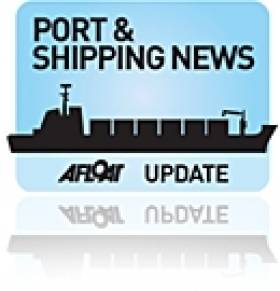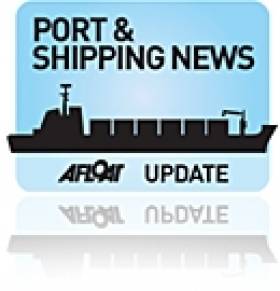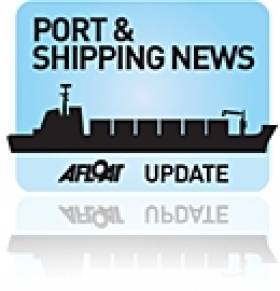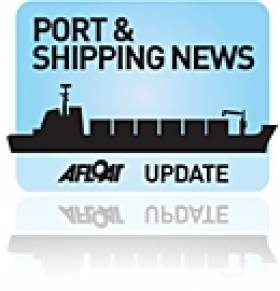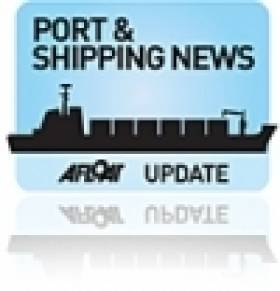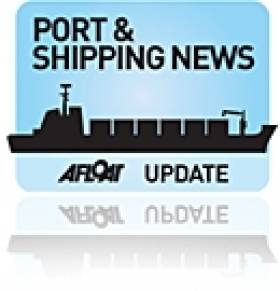Displaying items by tag: Arklow Shipping Ltd
Cargoship Gets into Scrap in Wicklow
The cargoship Arklow Rebel (2,999 gross tonnes) which loaded scrap metal in Wicklow Port today, is believed to be the largest Arklow Shipping Ltd vessel to dock in the east coast port, writes Jehan Ashmore.
The 7-year old Dutch-built vessel arrived in ballast from Warrenpoint Co. Down around 01.30hrs to berth alongside the town's south quays at the Packet Quay.
Throughout this afternoon there was a steady stream of lorries laden with the scrap-metal which was loaded into the ship's hull by a quayside grabber. Upon completion of loading, the distinctive green hulled Arklow Rebel departed this evening bound for Liverpool.
She is one of nine 'R'class series of ships built by the Dutch shipyard of Barkmeijer Stroobos B.V. and has the following dimensions (90m length X 12m breath X 4m draft). For further vessel characteristics click HERE.
The Irish-flagged vessel is registered at the neighbouring port of Arklow to the south and is part of a fleet of over 40 ships managed by the Tyrrell family.
During the boom years Wicklow port was particularly busy with Scandinavian imports of bundled packaged timber and plasterboard for the construction industry.
The tidal port at the mouth of the River Leitrim also specialises in paper, lead, steel and dry bulk cargoes, principally coal in addition to other general and heavy-lift project cargoes.
For many years the issue of road traffic congestion was finally solved when the Wicklow Port Access and Town Relief Road Scheme was completed in April of last year.
The port access road (1.6km) runs between the Rathnew Road to The Murrough via a bridge that crosses the Broadlough Estuary and over the Dublin-Rosslare railway line.
- Wicklow
- Arklow Shipping Ltd
- Wicklow harbour
- Liverpool
- ASL
- Wicklow Port
- Port of Wicklow
- Wicklow Port Access and Town Relief Scheme
- Arklow Rebel
- Tyrrell
- ScrapMetal
- Port and Shipping News
- Packet Quay Wicklow
- Wicklow Port Company
- Broadlough Estuary
- River Leitrim
- The Murrough
- DublinRosslare railway line
- Barkmeijer Stoobos B.V.
Arklow's Asian Newbuilds
Arklow Shipping (ASL) has turned to the Sekwang Shipbuilding, South Korea for three general cargoships according to www.tradewinds.no
An order has been placed for three 14,200-dwt general cargoships at the yard for delivery from late 2012 to early 2013. The deal includes an option for an extra vessel. To read more click here.
Separate to the Asian newbuild programme is the 4,700 gross tonnes Arklow Bridge (click photo) the latest vessel completed for Arklow Shipping B.V. from the Dutch shipyard of Bodewes B.V.
The Co.Wicklow based company was established in 1966 and has a current fleet of over 40 vessels under the Irish, Dutch and Antiguan flags.
The Future’s Green, Bright and Orange
This month ASN are due delivery of the 4,700 gross tonnes Arklow Bridge, the second 'B' class newbuild was also built by the Dutch company of Bodewes Shipyards B.V. She is the fifth vessel to carry this name since Arklow Shipping was founded in 1966.
The Arklow Bridge is registered in St. John's the capital of the Caribbean island of Antigua where she will be flagged. Antigua became an associated state of the Commonwealth until it was disassociated from Britain 30 years ago.
Her sister Arklow Brook entered service this year and is designed with two holds with a total (grain and bale) capacity of 9473.1m3 or an equivalent of 33,4524 ft3.
For cargo-separation the holds can be sub-divided by a portable bulkhead in up to 8 positions. In addition to carrying agricultural-based cargoes, the 116m (OA) overall long vessel can handle 177 (TEU) containers in the hold and another 88 can be stowed on top of the hold's hatch covers. Both the holds are fitted with dehumidifier's.
The power-plant is derived from a MaK 6M32C 2999kW main engine with a Renk gearbox and Berg controllable pitch propeller that provides around 12 knots.
With the entry of Arklow Bridge, the combined fleet is over 40 ships that trade in the north-west of Europe and the Mediterranean. For further vessel statistics of the sisters click here and for a photo of the new vessel click this link.
Asides the Rotterdam based operation of ASN, the Irish side of the company is the largest indigenous owned shipping company in terms of Irish-flagged and registered tonnage. Arklow is not only the headquarter's of ASL but the homeport is also where the vessels are registered.
- Dublin Port
- Co. Wicklow
- Arklow Shipping
- Newbuilds
- The Netherlands
- Arklow Shipping Ltd
- Ports and Shipping News
- Caribbean
- DryDock
- Antigua
- British
- Dublin Port news
- Arklow Bridge
- Arklow Brook
- ASN
- Arklow Shipping B.V.
- Irishflagged
- Irishregistered
- Arklow Future
- Bodewes Shipyards
- Dutchflagged
- Antiguaflagged
- Mak
- The Commonwealth
- River Avoca
The act is designed to assist in securing the future of the Irish shipping sector in which five new companies in 2010 entered the scheme, generating an increase of 44% in the number of vessels (from 154 to 177) covered by the Tonnage Tax. Half of these vessels range less than five years old with the total average age at eight years.
In addition the initiative has directly created 314 jobs in 2009 to nearly 350 jobs last year. Most of the employment is in specialised areas such finance,technical management, operations and chartering.
Commenting on the data, IMDO Director Glenn Murphy said "The results are a positive indication that after long periods of decline for the industry that policy support measures have encouraged investment which has led to growth and new employment. We are optimistic that direct employment
in the high value professional shipping services sector could double over the next five years leading to further investment and job creation opportunities"
The majority of Irish-based ship-owning firms operating within the ITT scheme are not entirely reliant on the Irish economy for their daily core revenue streams but are instead employed in the international shipping markets.
In 2010 the global shipping business had total charter trading transactions estimated at $450 billion dollars. It was a year in which the shipping markets continued to be quite volatile with most sectors still recovering from large charter earnings declines over the previous 12 months. Overall Irish firms were quite resilient in their ability to compete last year.
The growth in this sector in Ireland has been driven by established Irish-owned companies Arklow Shipping Ltd (ASL) and the Mainport Group and inward investment has come from D'Amico and Ardmore Shipping. The chemical and products tanker fleet operator located its headquarters to Cork last year and the company is backed by a large US private equity firm.
To read more from the report, you can request a copy by contacting the IMDO by e-mailing [email protected]
Irish cargo-ship remains aground off Drogheda Port
The Drogheda Port Company's patrol launch, Boyne Protector has been monitoring the situation as the Arklow Raider lies close to the entrance of the Co. Louth port.
Arklow's Autumn Arrivals
Arklow Shipping Ltd (ASL) await the delivery of the 2,998 gross tonnes newbuild, Arklow Fern, this month from Spanish shipbuilders Astilleros de Murueta SA, writes Jehan Ashmore.
In addition ASL are to introduce during the Autumn the newbuild Arklow Meadow after a delivery voyage from the Far East. At 14,000 tonnes, Arklow Meadow represents the fourth in a series of six 'M' class newbuilds ordered from the Mokpo Shipyard Corporation in South Korea.
The 'M'-class newbuilds have four-holds with a total grain capacity of 18,110 cubic square-metres.The main engine plant is a MaK 6M 43C which
has a 5,400KW capacity through a Jake reduction gear-box fitted to a Rolls Royce controllable pitch propeller producing around 14 knots.
With the entry of these two newbuilds, the fleet rises to 41 vessels. The fleet are divided into two management companies, one based at the shipping operators headquarters in Arklow and the other is controlled through a Dutch subsidiary, Arklow Shipping Netherlands (ASN) B.V. based in Rotterdam.



























